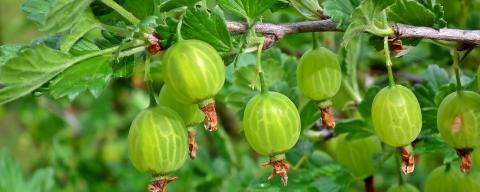Can I legally grow currants or gooseberries in New Hampshire?
Although gooseberries and currants can thrive in the short growing season and relatively mild climate of New Hampshire, it is important to know that many varieties are prohibited by state regulation because they serve as the alternate host for white pine blister rust (WPBR), a serious disease of white pine.
In 2012 and 2013, a statewide survey on plants of currants and gooseberries revealed that previously known WPBR-resistant and immune varieties were vulnerable to the disease. In response, the N.H. Division of Forests and Lands updated the list of approved varieties that are allowed to be grown in the state with a permit.
Current list of approved varieties
Black currants
- Crandall (plant is often grown for its ornamental yellow flowers and red fall foliage)
- Willoughby
Red currants
- Rondom (from a breeding program in the Netherlands)
White currants
- White Currant 1301 (high yielding, late, from Sweden)
Gooseberry & gooseberry crosses
- Jostaberry (blackish fruits with bland flavor produced on thornless plants, from Germany)
- Jahns Prairie (fruits are red and flavorful, a joint USDA/Ag Canada release)
- Captivator, Careless, Clark, Crown Bob, Downing, Howards Lancer, Sabine
More information on WPBR can be found online, as well as a permit application.
Cultivation requirements
General cultivation requirements for currants and gooseberries include a cool, moist growing area with well-drained loam soils rich in organic matter and a pH around 6.5.
Partial shade is tolerated, and Northern slopes with protection from direct sun are ideal. Red currants and gooseberries are self-fruitful – a single plant or variety will produce fruit without pollination from a different plant. However, cross pollination will usually result in bigger crops and larger fruit.
Many black currants are self-sterile – plant at least two different varieties of black currants to ensure good fruit set.
Do you love learning about stuff like this?
SUBSCRIBE TO Granite State Gardening newsletter
Got questions? The UNH Extension Yard and Garden Infoline offers practical help finding answers for your yard and garden questions.
Call toll free at 1-877-398-4769, Monday to Friday, 9 a.m. to 2 p.m., or fill out webform.

